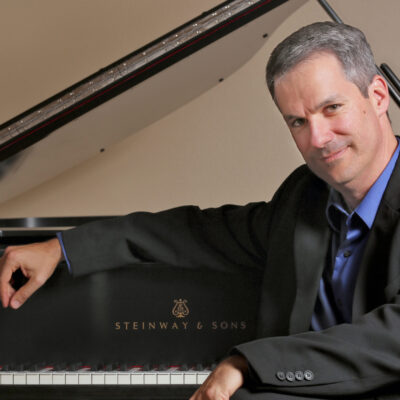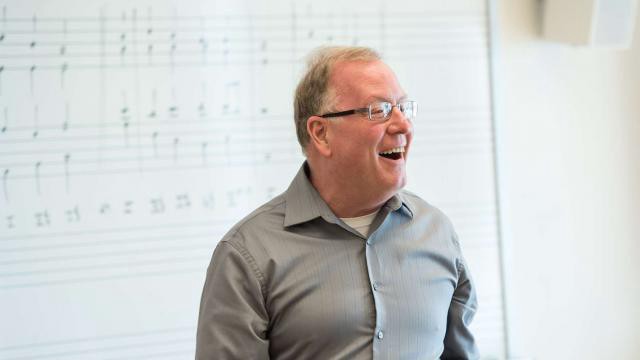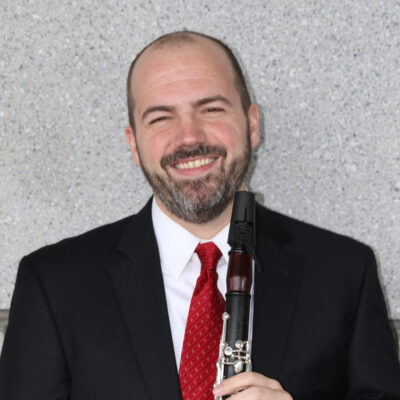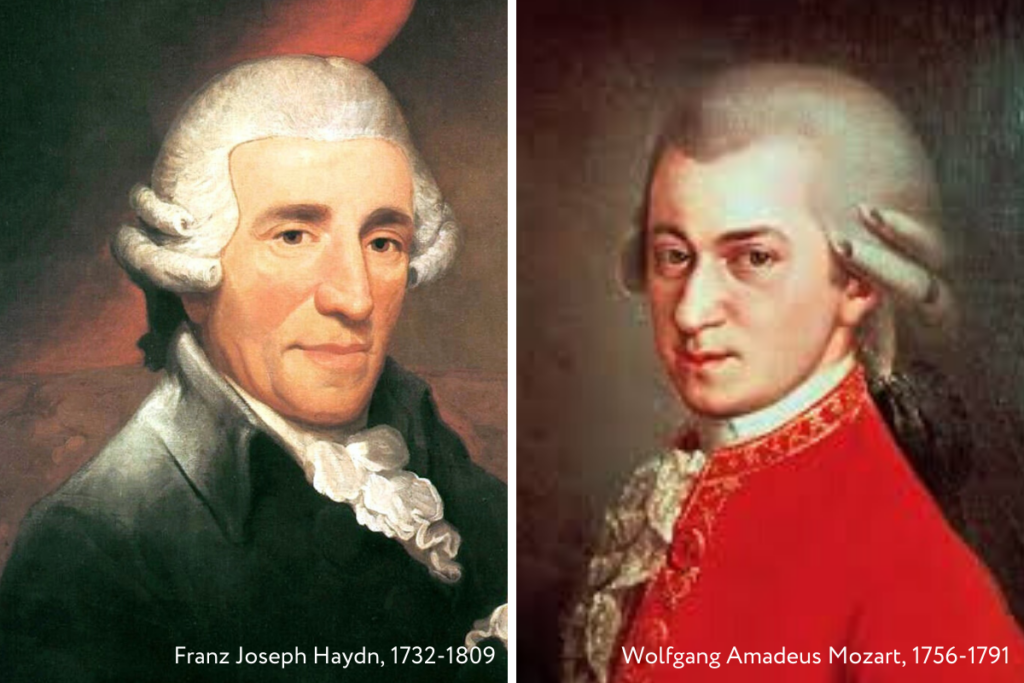 Haydn was the vastly accomplished composer of the era. 24 years younger, Mozart’s reputation was on the rise. Both were prolific, both admired each other’s work, and a close friendship soon ensued in 1780s Vienna.
Haydn was the vastly accomplished composer of the era. 24 years younger, Mozart’s reputation was on the rise. Both were prolific, both admired each other’s work, and a close friendship soon ensued in 1780s Vienna.
If only I could impress Mozart’s inimitable works on the soul of every friend of music, and the souls of high personages in particular, as deeply, with the same musical understanding and with the same deep feeling, as I understand and feel them, the nations would vie with each other to possess such a jewel.”—Haydn on his young friend Mozart
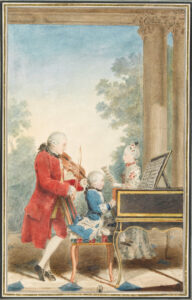
Mozart family on tour: Leopold, Nannerl and Wolfgang Mozart
While Wolfgang Mozart spent his childhood being paraded by his father Leopold around the courts of Europe with his similarly talented older sister Nannerl, Joseph Haydn was already the pre-eminent, rock star composer and elder statesman of symphonic music of the era.
By the time the two actually met in Vienna in December 1783, Mozart probably didn’t need mentoring by anyone. Aged 28, he had relocated to the city from Salzburg, having finally extricated himself from the constraining terms of service to his patron, Archbishop Colloredo. He was an accomplished pianist, and his reputation as a composer was established thanks to the acclaimed 1782 opera The Abduction from the Seraglio. The prolific 52-year-old Haydn meanwhile had an astonishing 78 symphonies under his belt. Having just renegotiated his contract with his patron Prince Nikolaus Esterházy, Haydn was exploring commissions from other patrons, and he was beginning to escape the creative isolation of life at Esterházy’s estate for the bustle of Vienna, which is where he first encountered Mozart.
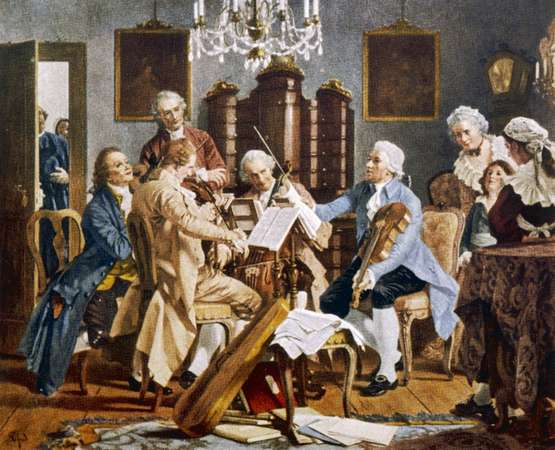
Joseph Haydn conducting a quartet
The two seem to have crossed paths for the first time at a musicians’ benefit concert in December 1783 which featured works by both composers on the program. It’s clear from contemporary accounts that Mozart and Haydn admired each other and that the two men quickly developed a deep friendship. Through the 1780s in Vienna, the two composers played together in impromptu quartets, with Haydn on violin and Mozart playing viola. Haydn helped his younger colleague by lending Mozart his own, heavily annotated copy of a textbook on Baroque counterpoint. Mozart would affectionately address Haydn as “Papa,” and he used the less formal “du” form of speech in German, which would have been quite unusual considering the age gap between the two men.
Their friendship was further affirmed in 1785 when Mozart dedicated his six “Haydn quartets” to his older friend. Usually, compositions would have been dedicated to a wealthy patrons or sponsor of the work, however it’s a measure of Mozart’s deep regard for his friend and mentor that he chose to dedicate these works to Haydn instead.
Mozart describes sending his “six sons” (six quartets) to his “best friend”:
A father who had decided to send his sons out into the great world thought it his duty to entrust them to the protection and guidance of a man who was very celebrated at the time, and who happened moreover to be his best friend. In the same way I send my six sons to you…
Please, then, receive them kindly and be to them a father, guide, and friend! … I entreat you, however, to be indulgent to those faults which may have escaped a father’s partial eye, and in spite of them, to continue your generous friendship towards one who so highly appreciates it.”—Mozart
Haydn heard the new quartets for the first time in January 1785, and according to Mozart’s father, exclaimed:
I tell you before God, and as an honest man, your son is the greatest composer known to me by person and repute; he has taste and what is more the greatest skill in composition.”
Haydn’s high regard for his young friend is evident in a 1787 letter he wrote to a friend: “If I could only impress on the soul of every friend of music, and on high personages in particular, how inimitable are Mozart’s works, how profound, how musically intelligent, how extraordinarily sensitive! (for this is how I understand them, how I feel them) — why then the nations would vie with each other to possess such a jewel within their frontiers… but should reward him, too: for without this, the history of great geniuses is sad indeed, and gives but little encouragement to posterity to further exertions… It enrages me to think that this incomparable Mozart is not yet engaged in some imperial or royal court! Forgive me if I lose my head. But I love this man so dearly.”
The last time that Haydn saw Mozart was right before Haydn left for London in December 1790, almost exactly a year before Mozart’s untimely death. According to Haydn’s biographer, to whom Haydn recounted the details of their final meeting some 15 years later, Mozart spent the whole of Haydn’s last day in Vienna. Here’s his rather breathlessly dramatic retelling of events:
[Mozart] dined with him, and said at the moment of parting, “We are probably saying our last farewell in this life.” Tears welled from the eyes of both. Haydn was deeply moved, for he applied Mozart’s words to himself, and the possibility never occurred to him that the thread of Mozart’s life could be cut off… within the following year.
When Mozart died at thirty-five, Haydn was distraught. Some time later, he wrote: “I was for some time quite beside myself over his death. I cannot believe that Providence should so quickly have called an irreplaceable man into the next world.”
Haydn eulogized Mozart, saying: “Posterity will not see such a talent again in 100 years.”
With the benefit of more than two centuries of hindsight, few would argue with Haydn’s assessment of his young friend’s remarkable talents.
Mozart’s first symphony, written when he was eight, and Haydn’s last symphony, are paired on MOZART AND HIS MENTOR, which takes place on Saturday, November 16th at 8 PM and Sunday, November 17th at 4 PM at the Lesher Center for the Arts in Walnut Creek. Tickets start at $42 / $20 for students 25 and under with valid Student I.D. and can be purchased online or by calling the Lesher Center Box Office at 925.943.7469.

